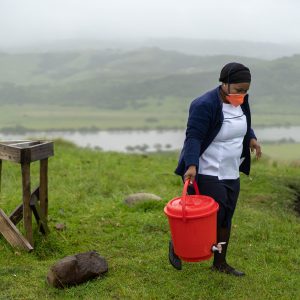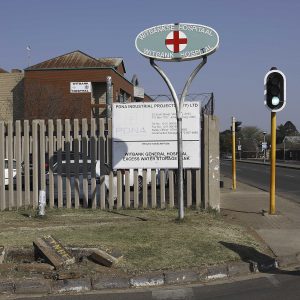Healthcare workers laid off but strike back
Eastern Cape healthcare workers, supported by short-term staff, have shut clinics to protest against the health department’s decision not to renew Covid-19 contracts.
Author:
23 February 2021

The Eastern Cape health department has laid off hundreds of frontline health workers, leading to strikes across the province. Community healthcare workers who have been given temporary contracts for up to 21 years also joined the protests.
The nurses, community healthcare workers and other support staff were hired as Covid-19 frontline staff on one-year contracts in April 2020. The workers expected their contracts to be renewed because hundreds of staff members have died of the coronavirus in the past year, and because there were chronic staff shortages in the Eastern Cape health department before the pandemic.
But on 12 February 2021, the superintendent general of health in the province, Sibongile Zungu, wrote to all health managers: “Due to the continued fiscal constraints experienced by the department as a result of the payment of medico legal claims and the budget cuts on the department’s allocation over the … (medium term), the department is not in a position to commit to Covid-19 contract appointments beyond 31 March 2021.”
Related article:
Zungu would not say exactly how many workers were affected or why the department did not place the health workers in posts left vacant by permanent staff who had died of Covid-19.
“It is a very difficult situation. The budget was also cut going into the new financial year. Covid-19 disrupted the health sector at many levels,” she said.
But deputy general secretary of the Young Nurses Indaba Trade Union (YNITU) Lindiwe Dumalisile said the department was hiding the number of affected workers to avoid a public backlash.
“The department is also concealing the number of frontline healthcare workers who died of Covid-19. They have not been replaced. There were gross staff shortages even before the pandemic. It is a chronic problem which the provincial health department is not prepared to address,” said Dumalisile.

The Covid-19 contract staff responded by holding work stoppages from 13 February. In Port Alfred, about 60km from Makhanda, health workers reportedly stripped off their clothes when the district manager tried to stop them from closing the facility.
After the workers told the manager that if he attempted to enter the premises he would have to face them naked, he left quickly, said a nurse who did not want to be named. There were also protests in East London, Port Elizabeth and Makhanda.
Temporary workers want contracts
A separate group of community healthcare workers have also gone on strike. This group earns R3 500 per month with no benefits. They are on annual contracts – some for 21 years.
Sandiswa Jela, who has been on temporary contracts in Makhanda’s NG Dlukulu clinic for 10 years, said, “All we want are permanent contracts. [The Eastern Cape health department] made us into Covid-19 frontline workers. We went door to door since the pandemic started, in all weather. Two of us here have died of coronavirus. But the department didn’t even offer to arrange a drive-through funeral. They didn’t even offer us a car. We [community healthcare workers] collected R20 each to help pay for our colleagues’ funerals. When we contracted coronavirus, they sent us for 10 days’ isolation and that was it.”

NG Dlukulu clinic shop steward Masixole Faku of the National Education, Health and Allied Workers’ Union (Nehawu) said his community healthcare worker colleagues had started off on wages of R1 000 per month, which only increased to R3 500 after about 15 years.
“They are being victimised and are not cared for. They do so much work but are not getting permanent employment. It is such a mess. Closing the clinics was a last resort. Even with the clinics closed, there is no movement from government’s side. When we question the management from the sub-district about the [community healthcare workers’] contracts, they just say they don’t know anything.”
Vuyiswa Songezo* works at the V Shumane clinic in Makhanda’s Tantyi township. “I had Covid-19 last year from my work. I nearly died. I was on oxygen for five days. The Department of Health did not even ask how I was feeling. The hospital had run out of oxygen, so I had to buy it at a cost of R1 100,” said Songezo.
Related article:
Songezo and seven of her colleagues from Tantyi clinic, who asked for their names not to be used, said they had been on temporary contracts for between 14 and 21 years.
“Community healthcare workers must be employed permanently as they are in Gauteng. Why not here? This is one country. What is the difference? We are doing the same job,” said one of them.
“The Department of Health truly does not care about us. We are working very hard. They told us that when they have available positions for porters they will hire us but we refused that. We need to be absorbed into the job we are doing. The community here accepts us,” said another of the Tantyi community healthcare workers.
Healthcare workers fight to be heard
The province’s health workers are represented by a combination of all the health unions, an alliance made up of Nehawu, YNITU, the Democratic Nursing Organisation of South Africa, the South African State and Allied Workers’ Union, the National Union of Care Workers of South Africa and the Democratic Municipal and Allied Workers Union of South Africa.
They sent a memorandum on 17 February to Zungu saying the Covid-19 contract health workers had “acted beyond bravery through availing ourselves in the most desperate time to wage a war against the deadly coronavirus. We maintained our pledges of allegiance although conditions were not favourable for us to do so … even when we saw that our provincial government does not have the required capacity to protect the healthcare workers … We refuse to be used.”
If their one-year contracts were not converted into permanent ones, the health workers vowed to “subject the entire department to pandemonium”, the memorandum added.
By 19 February, police had arrived at the different Makhanda clinics and used bolt cutters to open the locked-up buildings. The police then insisted the permanently employed nurses go back to work while the striking community healthcare workers stayed outside. Instead, all the workers went to a meeting convened by the Unemployed Peoples’ Movement and decided to continue the stay-away.

“It is important for the community, [healthcare workers] and the permanent staff to stand together because we are all working class and our strength is in our unity. The bosses will always pit a worker against another worker. It is also disgusting and an indictment on the government to send police when the health workers are fighting for their rights,” said Ayanda Kota, spokesperson for the Unemployed Peoples’ Movement.
Zungu would not say if the department planned to offer permanent contracts to community healthcare workers, noting only that “the matter of community health workers is under consideration at the National Department of Health”.
Related article:
Community healthcare workers have been fighting to be made permanent for a long time. On the night of 16 July 2020, police opened fire with rubber bullets on about 100 of them camping inside the provincial legislature for the night in the hopes of meeting then health member of the executive council Sindiswa Gomba. The scattered community healthcare workers walked 8km to King William’s Town to find shelter.
Community healthcare workers in the Western Cape are in the same position as their Eastern Cape counterparts. But last year, community healthcare workers in Gauteng won a 10-year battle to be made permanent, following a 2016 labour court victory that ruled they were employees of the state.
*Not her real name. Healthcare workers asked for their names to be concealed for fear of reprisal.



